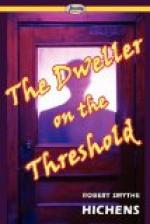“I believe it is something important,” he said in a gentle, rather wavering voice; “otherwise—I am hardly fit, I fear, to be with my kind. I”—He sat down—“I have had a terrible shock, Mr. Malling. You have heard?”
“You mean Mr. Harding’s death?”
“Yes.”
“I have just heard of it.”
“It occurred at half-past three o’clock last night, or, rather, this morning. He had been declining for a long while. At the last he just faded out, as it were. The strange thing is that I knew the exact moment when he entered into rest.”
“You weren’t with him?”
“Oh, no. I was here, asleep. But at three o’clock I awoke. I felt violently agitated. I can scarcely describe the sensation. It was as if I was torn, as if mind and body, or spirit and body, were torn, lacerated. I suffered the greatest conceivable agony. I tried to cry out, but I could not. Nor could I move. Then everything suddenly seemed to fail, all in a moment, and I was at peace. But it was like the peace of death, I think. And I was aware—I don’t know how—that Mr. Harding was dead. I moved. I looked at my watch. It was a minute after half-past three. I noted down the time. And this morning—I heard.”
“And then?”
“Only then I understood my loss—the loss to us all. Ah, Mr. Mailing, you knew him, but not as I did! Few or none knew him as I did. He was the greatest and best of men, full of power, but full of kindness and goodness, too. He guided me in everything. I can never tell you how I looked up to him, how I trusted him. His judgment was extraordinary, his reading of character was unerring. I do believe he knew me better than I knew myself. What shall I do without him?”
The curate’s grief was almost as genuine and unself-conscious as a child’s, and Malling felt as if at that moment, like a child, he felt himself adrift in a difficult world. His gentle, kindly, but not strong face was distorted, but not hardened, by his distress, which seemed begging for sympathy. And Malling remembered the Henry Chichester he had known some years ago, before the days of St. Joseph’s, the saintly but rather weak man, beloved by every one, but ruling no one. That man was surely before him, and that man knew not how to play a hypocrite’s part. Yet Malling felt he must test him.
“His death is very sad,” he replied; “but surely his powers had been on the decline for a long while.”
“His powers, but not his capacity for goodness. His patience was angelic. Even when the cruelest blow of all fell upon him, even when his wife—whom, God forgive me! I don’t think some of us can ever forgive—even when she deserted him in his hour of need, he never complained. He knew it was God’s hand upon him, and he submitted. He has taught me what true patience is. What I owe to him! What I owe to him!”
As if distressed beyond measure, the curate got up, almost wringing his thin hands.




